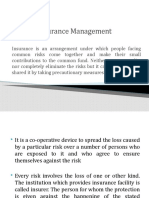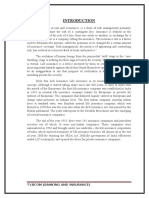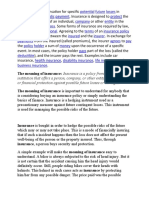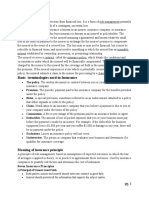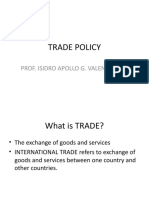Insurance
Insurance
Uploaded by
raghunaikaCopyright:
Available Formats
Insurance
Insurance
Uploaded by
raghunaikaOriginal Description:
Copyright
Available Formats
Share this document
Did you find this document useful?
Is this content inappropriate?
Copyright:
Available Formats
Insurance
Insurance
Uploaded by
raghunaikaCopyright:
Available Formats
Insurance:
Introduction: one of the main features of business is risks and uncertainities, which are
unavoidable. Out of these innumerable risks, some can be avoided, some can be borne by
the businessmen and some others can be distributed to a large number of individuals. So
the risks like loss due to fire, theft, accidence etc are covered by insurance. Insurance does
not avoid the risks but it protects the insured party against the risks. Thus the method of
dividing and shifting the risks is called insurance.
Meaning of insurance:
Insurance is a means of shifting the risks to insurers in consideration of premium.
Insurance is a device to protect against certain risks. Insurance is a contract between
insurer and insured. Where by insurer undertakes to compensate the insured for the loss, in
exchange for a fixed sum called premium. The person who undertakes to compensate the
risk is called insurer. The person whose loss is to be made good is called insured. The
amount for which a policy is issued to the insured is called insured amount. The document
containing the terms and conditions of contract of insurance is called insured policy.
Thus, insurance is a social device for pooling and dividing risks among large number of
people.
Need for insurance:
Insurance is of great help in the field of commerce. It help in the field of commerce.
It helps the traders and businessmen to carry on their commercial activities smoothly and
efficiently, without worrying about risks and uncertainties. It is the prerequisite for
effective trade and commerce. In the recent years, the scope of insurance has been
increasing. Thus insurance plays a major role in the modern business activities. The
important benefits of insurance are:-
1) It provides protection against risk and uncertainty.
2) It distributes risks over a large section of the society.
3) It helps in improving the efficiency of business by providing security and safety to
the business people.
4) It avoids the businessmen to maintain huge reserves to face risks.
5) It facilitates foreign trade by providing protection against heavy risks, both at air and
water transport.
6) It is a means of social security.
7) It generates employment opportunities to the people.
8) It is a means of mobilization of capital in a country.
9) It invests the funds to serve the best interest of the nation.
Principles of Insurance:- insurance contracts are based on the following basic principles:
1) Utmost Good Faith:- a contract of insurance is an uberrima fides contract, that is
a contract based on utmost good faith. As per the principle of utmost good faith,
both the parties of the contract insured and the insurer, should disclose all material
facts while entering in to the contract and should display the utmost god faith
towards each other. If any material fact is concealed by the insured, the insurer can
cancel the contract.
2) Insurable Interest:- another principle of insurance contract is that the insured
must have an insurable interest in the subject matter of insurance. Insurable interest
means pecuniary or monetary interest in the subject matter of insurance. For
example, a person must have insurable interest in his life when the policy is taken,
in the case of life insurance. Similarly the insured must have insurable interest in
the properties insured against fire, in the case of fire insurance.
3) Indemnity:- every contract, except for life insurance contracts, is a contract of
indemnity. Here the insured can get only the compensation for the actual loss
suffered by him and is not allowed to make any profit out of such losses. The
principle of indemnity is applicable in the case of fire insurance and marine
insurance only. It is not applicable to life, personal accident and sickness insurance.
4) Subrogation:- the principle of subrogation is an extension and a corollary of the
principle of indemnity. According to it, after the insured is compensated for the
loss caused to him, the right of ownership of such property passes on to the
insurer. Thus the insurer is substituted in the place of the insured as the rightful
owner of the property. This principle applies to all insurance contracts expect
personal insurance.
5) Contribution:- the principle of contribution becomes applicable in the case of
double insurance. It implies when a person gets two or more insurance for one risk,
the different insurers will contribute to the total payment in proportion to the
amount insured by each. So all the insurers will share the burden of payment. This
principle is not applicable to life and personal policies.
6) Mitigation of loss:- in the event of a mishap, the insured must take all possible
steps to mitigate or minimize the loss to the subject matter of insurance, as if they
were uninsured. Thus it is the duty of the policy holders to make a reasonable effort
to avoid the losses, as for as possible.
7) Causa proxima:- according to the principle of causa proxima, when a loss is
caused, the insurer is liable to compensate for the loss due to nearest or immediate
cause of loss and not the remote cause. So the insurers are not liable for remote
causes and consequences, even if they belong to the category of insured losses.
Double Insurance:- when the same risk is insured with two or more insurers it is known
as Double Insurance. A person is free to take more than one insurance policy for the
same property. But as per the principle of contribution, a person can not recover more
than the actual amount of loss, from one insurer or from all the insurers. Double insurance
does not apply to the life insurance and so the person can recover the full amount for all
the policies.
Reinsurance:- when an insurer reinsures the whole or a part of his risk with other
insurers, it is known as reinsurance. Insurer who reinsures the risk is called the original
insurer and with whom the risk is reinsured is called the re-insurer. It is always between
two or more insurers only. It is done either to reduce the risk or to make a profit.
Reinsurance may be:-
a. Facultative Reinsurance, where the individual risk is separately reinsured.
b. Treaty Reinsurance, where the insurer agrees to accept certain proportion of all
risks beyond a certain limit underwritten by the insurers.
Distinction between Double Insurance and Reinsurance:- double insurance differs
from Reinsurance in the following ways:-
DOUBLE INSURANCE REINSURANCE
1. It is a contract between insured and
two or more insurers.
1. It is a contract between the original
insurer and the reinsurer.
2. It is done to have better security. 2. It is done either to reduce the risk or
to make profit.
3. Here there is no redistribution of risk. 3. Here, there is redistribution of risk.
4. Here the insured will have separate
rights against all the insurers.
4. Here the insured will have rights only
against the original insurer.
5. It is beneficial only in life insurance
contracts.
5. It is common under fire and marine
insurance.
6. It is not compulsory. 6. It is obligatory in some cases.
7. Here all the insurers share the loss
proportionately.
7. Here the liability for loss falls on the
original insurers.
8. It may result in over insurance. 8. There is no question of over
insurance.
Types of Insurance:- there are many types of insurance like Life Insurance, Fire
Insurance, Marine Insurance, Accident Insurance, Sickness Insurance, Burglary Insurance,
Live Stock Insurance, Crop Insurance, Vehicle Insurance etc.
The most important forms of insurance are life insurance, fire insurance and marine
insurance.
6. life Insurance:- Life insurance is a contract under which the insurer in consideration of
premium paid, undertakes to pay a fixed sum of money either on the death of the insured
or on expiry of a specified period of time, which ever is earlier. The premium can be paid
either in lump sum or by monthly, quarterly, half yearly or yearly installments. Human life
is the subject matter of life insurance. Life insurance is a contact of guarantee and not a
INSURANCE
LIFE
INSURANCE
HUMAN LIFE
FIRE
INSURANCE
PROPERTIES
AND GOODS
MARINE
INSURANCE
SHIP AND
CARGO
contract of indemnity. So the insurer undertakes to pay a fixed amount either on the death
of the insured or on the expiry of a fixed period. As the event is certain to happen and the
payment is certain in life insurance, it is also known as Life Assurance. Usually the non
payment of premium brings the contract to an end.
Life assurance contract is based on two important principles utmost good faith and
insurable interest. So the insured (assured) is bound to observe complete good faith and
reveal all the material facts known to him, relating to his life. Similarly the assured must
have insurable interest in the life insured. For example a husband has an insurable interest
in the life of his wife and a wife in the life of her husband.
Life Insurance Policy:- life Insurance Policy is a legal document in writing containing the
contract between the insurer and the insured. It contains the terms and conditions under
which a life has been insured. It is issued to the proposer, after the proposal form is dully
filled in and signed by him, is accepted by the insurer and the first premium is paid. The
life insurance policy contains the date when the risk begins, the sum assured, the age of the
insured, the type of policy, the amount of premium etc.
Benefits of Life Insurance:-the important advantages of life insurance are as follows:
i. It provides protection to the dependents of the insured, in the case of death.
ii. It helps to improve the trade and commerce.
iii. It mobilizes saving of the people through different insurance linked saving schemes.
iv. It channelizes the public savings in productive investments for the economic
development of the country.
v. It assures a risk free life to the community at large.
vi. It enables a person to enjoy peace of mind and a sense of security.
Thus life insurance provides several benefits to individuals, business enterprises and
the society.
Types of life insurance policies: the following are the main types of life insurance
policies:
a) Whole Life Policy: whole life policy is a low cost insurance plan, where the policy runs
through out the life of the policy insured. Here the insured has to pay the premium
throughout the life time and the sum assured is paid on the death of the insured. It is
also called as Ordinary Life Policy.
b) Joint Life Policy: Joint Life Policy taken upon the joint lives of two or more persons
like husband and wife. Under such policies, the sum assured will be paid either at the
end of fixed term or an the death of any one of the insured persons.
c) Endowment Life Policy: here the sum assured is payable on the death of the insured
or on the date of the maturity, whichever is earlier. It will mature in a limited number of
years. The rate of premium is little higher than that for the whole life policy. It provides
both protection as well as savings for old age.
d) Annuity Policy: here the sum assured is payable in fixed periodical payments for a
specified period or till the death of the insured.
e) Janatha Policy: janatha policy was introduced in order to extend the benefits of life
insured to lower income people.
f) Childrens Endowment Policy: it is taken for the purpose of higher education or
marriage of children.
g) Group Insurance Policy: group insurance policy is a plan of insurance under which
the lives of several persons are covered under one policy like the policy taken on the
lives of employees by an employer.
Surrender Value: when a policy holder is unable or unwilling to pay the premium, he may
surrender the policy. Surrender value is the cash value of the policy which the insurer is
prepared to pay at a particular time in total discharge of the insurance contract. It is less
than the total amount of premium paid.
Paid up Value: if a policy holder wants to terminate the policy, he may convert his policy
in to paid up policy. Paid up value is equal to the premium paid and is payable to insured
only after the maturity of the policy.
Distinction between Life Insurance and General Insurance: life insurance differs
from General Insurance in the following ways:-
LIFE INSURANCE GENERAL INSURANCE
1. It is a contract of guarantee. 1. It is a contract of indemnity.
2.Here, the event is certain. 2. Hence, the event is uncertain.
3. It is generally for a long period. 3. It is generally for a short period.
4. Here the policy can be
surrendered.
4. Here the policy can not be surrendered.
5. Here, double insurance is
common.
5. Here double insurance is not common.
6. It is a protection against risk and a
provision for saving.
6. It is a protection against actual loss only.
7. Here, always there will be claim. 7. Here there may not be a claim.
8.Rate of premium is based on age. 8. Rate of premium is based on the degree
of risk.
9. Here there is no question of over
or under insurance.
9. Here there is a possibility of over or
under insurance.
10. Here, the principles of
subrogation and contribution are not
applicable.
10. Here, the principles of subrogation and
contribution are applicable.
Marine Insurance: Marine Insurance is a contract under which the insurer undertakes to
indemnify the insured against marine losses. Marine risks are storm, ship collisions,
burning of the ship, sinking of the skip, wild waves, jettison, explosion etc. it is a device to
ensure protection for transportation on the high seas. It is a contract of indemnity and is
very helpful in international trade.
Marine insurance may be :
1. Cargo Insurance: where the subject matter is cargo.
2. Hull Insurance: where the subject matter is ship and its equipment.
3. Freight Insurance: where the subject matter is freight.
4. Liability Insurance: where the third party liability of insured will be indemnified.
The main principles of Marine Insurance are:
1) Utmost Good Faith: the insured most disclose all material facts to the insurer, while
entering into the contract of marine insurance.
2) Insurable Interest: the insured most have an insurable interest, when the property
insured suffers a loss.
3) Indemnity: the insurer indemnifies he insured for actual loss or damage caused to the
insureds property by the perils of sea.
Marine Insurance Policy: Marine Insurance Policy is a written document containing the
terms and conditions of marine insurance contract between the insurer and the insured.
Generally it contains the particulars like name of the insured, particulars of the property,
risks covered, the sum insured, amount of premium, name of the ship, the name of the
insurer, the voyage or period etc.
Types of Marine Policies: the following are the most important types of marine
insurance policies are:
a) Valued Policy: it is a policy which specifies the agreed value of the subject matter of
the insurance at the time of issuing the policy.
b) Open Policy: it does not specify the value of the subject matter at the time of taking
out the policy.
c) Voyage Policy: it is a policy, where the subject matter is insured for a particular
voyage.
d) Time Policy: this policy will insure the subject matter for a specified period, unusually
not exceeding 12 months.
e) Floating Policy: it is a policy, in which the total sum assured is mentioned but not the
name of ship, description of cargo, etc.
f) Wager Policy: it is a policy in which the insured is not having any insurable interest in
the subject matter of insurance.
g) Fleet Policy: here, several ships belonging to the same owner are insured under one
policy.
h) Composite Policy: it is a policy where the subject matter is insured by more than one
insurer.
Warranties: a warranty means stipulations or terms, the breach of which entitles the
insurer to avoid the policy altogether. Warranty may be express or implied.
Express warranties are those terms, which clearly appear on the face of the policy. The
examples of express warranties in marine insurance are:
i. The time of sailing of the ship.
ii. The safety of the ship at a particular time.
iii. The limits of ships navigation.
Implied warranties are implied by law in every marine insurance contract and
includes:
a. Sea- worthiness of the ship.
b. Legality of trade.
c. Non-deviation of voyage.
d. Proper documentation of the ship.
Fire Insurance: fire insurance is a contract under which the insurer undertakes to
indemnity the actual loss suffered by the insured as a respect of damage caused to the
property, by fire, in return for a consideration known as premium. Fire insurance is a
contract of indemnity and the insured can not claim more than the amount of actual loss.
Fire Insurance contract is based on the following basic principles:
i. Utmost Good Faith: the insured is bound to observe good faith and reveal all
material facts to the insurer at the time of entering in to the contact.
ii. Insurable Interest: the insured must have an insurable interest in the subject
matter insured both at the time of taking out the policy and at the time of the loss.
iii. Indemnity: the insurer is bound to indemnify the insured to the extent of actual
loss suffered by the insured, by fire.
Fire Insurance Policy: fire insurance policy is a written document containing the terms
and conditions of fire insurance contract between the insurer and the insured. Usually it
contains the particulars like the names of the insurer and the insured, the sum insured, the
amount of premium, the period of insurance, the details of property insured etc. generally
it is issued for one year and can be renewed at the end of every year.
Types of Fire Insurance Policies: following are some of the common fire insurance
policies issued to meet the requirements of the public:-
1) Specific Policy: here the insurer covers the risk for a specific sum. The actual value of
the property is not considered while calculating the amount of compensation.
2) Valued Policy: here, the insurer is required to pay the agreed value to the insured, in
the event of the damage of the property by fire.
3) Average Policy: as this policy contains the average clause, where the insurer bears only
a proportion of the actual loss suffered by the insured.
4) Floating Policy: it covers the goods belonging to the same person in different lots in
different place.
5) Replacement Policy: here the insurer replaces the destroyed property by fire, instead
of paying compensation in cash.
6) Comprehensive Policy: it covers not only the risk of fire but also of explosion,
lighting, riot etc and such policies are not common in India.
You might also like
- LLB Refresher Notes Insurance LawDocument43 pagesLLB Refresher Notes Insurance LawKriti Bhandari93% (14)
- Pacific Grove Spice Company SpreadsheetDocument7 pagesPacific Grove Spice Company SpreadsheetAnonymous 8ooQmMoNs10% (1)
- TRADING COURSE'sDocument51 pagesTRADING COURSE'sDHAVAL29% (7)
- 3 Principles of InsuranceDocument15 pages3 Principles of InsuranceZerin Hossain100% (1)
- Essentials of An Insurance ContractDocument7 pagesEssentials of An Insurance ContractSameer JoshiNo ratings yet
- Insurance As ContractDocument3 pagesInsurance As ContractAparajita SharmaNo ratings yet
- What Is Risk ManagementDocument4 pagesWhat Is Risk Managementsudipta deyNo ratings yet
- Unit - 3 (B&i)Document13 pagesUnit - 3 (B&i)kirthikprathap07No ratings yet
- Concept of InsuranceDocument4 pagesConcept of InsuranceNazrul HoqueNo ratings yet
- Basics of Business Insurance - NotesDocument41 pagesBasics of Business Insurance - Notesjeganrajraj100% (1)
- 18bco32c U1Document14 pages18bco32c U1Vipul TyagiNo ratings yet
- Insurance PrinicilesDocument9 pagesInsurance PrinicilesEmmanuella ChantengNo ratings yet
- Insurance ManagementDocument27 pagesInsurance Managementzaks69No ratings yet
- Principles of Insurance: Risk Management, To HedgeDocument7 pagesPrinciples of Insurance: Risk Management, To HedgeifthisamNo ratings yet
- Insurance and Risk Management Unit IDocument9 pagesInsurance and Risk Management Unit Ipooranim1976No ratings yet
- Chapter 1-What Is Insurance?Document20 pagesChapter 1-What Is Insurance?Akshada Chitnis100% (2)
- Insurance Law in IndiaDocument44 pagesInsurance Law in IndiaVaibhav AhujaNo ratings yet
- Module 4 InsuranceDocument25 pagesModule 4 InsuranceSumiya YousefNo ratings yet
- Art InsuranceDocument62 pagesArt InsuranceAnkita DalviNo ratings yet
- InsuranceDocument18 pagesInsuranceDRUVA KIRANNo ratings yet
- Introduction To InsuranceDocument15 pagesIntroduction To InsuranceInza NsaNo ratings yet
- InsurancesDocument7 pagesInsuranceskidvictor16No ratings yet
- L7 BS Law of InsuaranceDocument10 pagesL7 BS Law of InsuaranceIan MutukuNo ratings yet
- Principles of Insurance - 7ef9f744f095959c3b12c38e78 - 231016 - 190009Document9 pagesPrinciples of Insurance - 7ef9f744f095959c3b12c38e78 - 231016 - 190009Drunk funNo ratings yet
- Open Course (Module 4)Document14 pagesOpen Course (Module 4)Sahil AnsariNo ratings yet
- Document (3) QQQQDocument3 pagesDocument (3) QQQQAnupriya ChuriNo ratings yet
- Functional Definition of Insurance: MeaningDocument6 pagesFunctional Definition of Insurance: MeaningShubham DhimaanNo ratings yet
- Insurance: 1 Lesson 1 Introduction To InsuranceDocument14 pagesInsurance: 1 Lesson 1 Introduction To Insurancevipul sutharNo ratings yet
- Insurance Law KenyaDocument6 pagesInsurance Law KenyaSenelwa Anaya100% (6)
- Child Insurance PlanDocument72 pagesChild Insurance PlanAnvesh Pulishetty -BNo ratings yet
- 1 Lesson 1 Introduction To InsuranceDocument61 pages1 Lesson 1 Introduction To InsurancerachitNo ratings yet
- 1 A InsuranceDocument16 pages1 A Insurancekalip87638No ratings yet
- Insurance Law (Definition, Nature and Function of Insurance) B. Principles of Insurance C. Kinds of InsuranceDocument13 pagesInsurance Law (Definition, Nature and Function of Insurance) B. Principles of Insurance C. Kinds of InsuranceAJAY TAJANo ratings yet
- Final DraftDocument71 pagesFinal DraftPayal RaghorteNo ratings yet
- Ty - Bcom (Banking and Insurance)Document36 pagesTy - Bcom (Banking and Insurance)BHAVESHNo ratings yet
- Principles of InsuranceDocument9 pagesPrinciples of Insurancebeena antuNo ratings yet
- UNIT 3 InsuranceDocument10 pagesUNIT 3 InsuranceAroop PalNo ratings yet
- Law of Insurance AnswersheetDocument55 pagesLaw of Insurance Answersheetkhatriparas71No ratings yet
- InsuranceDocument108 pagesInsurancesnehachandan91No ratings yet
- Pbi Module 4Document25 pagesPbi Module 4SUBHECHHA MOHAPATRANo ratings yet
- Chapter 5 - Insurance LawDocument11 pagesChapter 5 - Insurance LawMarrick MbuiNo ratings yet
- Institution That Offers A Person, Company, or Other Entity Reimbursement or Financial Protection Against Possible Future Losses or DamagesDocument16 pagesInstitution That Offers A Person, Company, or Other Entity Reimbursement or Financial Protection Against Possible Future Losses or DamagesHrishikesh DharNo ratings yet
- Fundamentals of Insurance - B. Com V - AS-2637Document10 pagesFundamentals of Insurance - B. Com V - AS-2637Sneha SNo ratings yet
- Chapter - 1 Introduction of InsuranceDocument12 pagesChapter - 1 Introduction of InsuranceErica MaldonadoNo ratings yet
- Class Notes Part 3Document5 pagesClass Notes Part 3greatsali70No ratings yet
- Banking and Insurance Unit III Study NotesDocument13 pagesBanking and Insurance Unit III Study NotesSekar M KPRCAS-CommerceNo ratings yet
- New Health Insurance Project Swati Sarang (Tybbi) UmDocument64 pagesNew Health Insurance Project Swati Sarang (Tybbi) UmMikant Fernando63% (8)
- MBA Project Report On Kotak Life InsuranceDocument61 pagesMBA Project Report On Kotak Life InsuranceCyberfunNo ratings yet
- InsuranceDocument144 pagesInsuranceShubhampratapsNo ratings yet
- General Principles of Law of InsuranceDocument5 pagesGeneral Principles of Law of InsuranceAasthaNo ratings yet
- Insurance Act 2010 (Theory) PDFDocument6 pagesInsurance Act 2010 (Theory) PDFCryptic LollNo ratings yet
- Unit 1 Introduction & Development of Insurance LawDocument174 pagesUnit 1 Introduction & Development of Insurance LawAnchalNo ratings yet
- Class - LL.B (HONS.) II SEM. Subject - Insurance Law: Unit I:IntroductionDocument26 pagesClass - LL.B (HONS.) II SEM. Subject - Insurance Law: Unit I:IntroductionVineet ShahNo ratings yet
- Insurance & Risk Management JUNE 2022Document11 pagesInsurance & Risk Management JUNE 2022Rajni KumariNo ratings yet
- Insurance NotesDocument46 pagesInsurance Notespuru100% (1)
- Child Insurance PlanDocument72 pagesChild Insurance Plan6338250% (4)
- UNIT 6 - Insurance BusinessDocument33 pagesUNIT 6 - Insurance BusinessAryan JalanNo ratings yet
- Introduction of InsuranceDocument11 pagesIntroduction of InsuranceNisarg ShahNo ratings yet
- Private Insurance CompaniesDocument17 pagesPrivate Insurance CompaniesRoselle OngNo ratings yet
- InsuranceDocument20 pagesInsuranceYvonne BarrackNo ratings yet
- Marketing Plan On PRAN Ice CreamDocument7 pagesMarketing Plan On PRAN Ice CreamsaadmansheedyNo ratings yet
- Torrent Power 20190319 Mosl Ic Pg034Document34 pagesTorrent Power 20190319 Mosl Ic Pg034Poonam AggarwalNo ratings yet
- Lessons Ideas Benjamin GrahamDocument9 pagesLessons Ideas Benjamin GrahamDivGrowth100% (4)
- Financial Performance AnalysisDocument110 pagesFinancial Performance AnalysisNITHIN poojaryNo ratings yet
- A Study On Dividend Policy and Its Effect On Market Price of Share of Ongc LTDDocument7 pagesA Study On Dividend Policy and Its Effect On Market Price of Share of Ongc LTDtejashwini sahukarNo ratings yet
- Kelvinator - RefrigeratorDocument1 pageKelvinator - RefrigeratorArvind D ArvindNo ratings yet
- Prota User ManualDocument245 pagesProta User ManualSimon Maurice0% (1)
- Cambridge Associates LLC U.S. Venture Capital Index and Selected Benchmark Statistics March 31, 2009Document11 pagesCambridge Associates LLC U.S. Venture Capital Index and Selected Benchmark Statistics March 31, 2009Dan Primack100% (1)
- CarlsbergDocument12 pagesCarlsbergAnonymous 1VDZJgQMNo ratings yet
- Australia's Longest Established, Leading TMT Focused M&A Corporate Advisory FirmDocument12 pagesAustralia's Longest Established, Leading TMT Focused M&A Corporate Advisory Firmrumengan kairNo ratings yet
- New Microsoft Word DocumentDocument9 pagesNew Microsoft Word DocumentAnonymous 4yUG6uhmgNo ratings yet
- Offshore Financial CentreDocument39 pagesOffshore Financial CentreAustin OliverNo ratings yet
- MiniCase02 Ch04Document2 pagesMiniCase02 Ch04MAR0% (1)
- 2017 10 TRL Bank Muscat Newsletter AJ EnglishDocument26 pages2017 10 TRL Bank Muscat Newsletter AJ EnglishAwais IqbalNo ratings yet
- TEQ A Methodology For Comparative Evaluation of TechnologiesDocument8 pagesTEQ A Methodology For Comparative Evaluation of TechnologiesBryan K. Aylas ParedesNo ratings yet
- Assignment 1 - Security Analysis and InvestmentDocument5 pagesAssignment 1 - Security Analysis and InvestmentTrần Phương Anh100% (1)
- Effects of Credit On Economic Growth, Unemployment and PovertyDocument13 pagesEffects of Credit On Economic Growth, Unemployment and PovertyrobyNo ratings yet
- Trade Policy: Prof. Isidro Apollo G. Valensoy, JRDocument28 pagesTrade Policy: Prof. Isidro Apollo G. Valensoy, JRkrisNo ratings yet
- Presentation For Mix Use FinDocument5 pagesPresentation For Mix Use FinalvahNo ratings yet
- V1 Exam 2 PMDocument26 pagesV1 Exam 2 PMAritra NandyNo ratings yet
- Faculty Business and Management Bbf211: Financial Reporting AnanlsisDocument7 pagesFaculty Business and Management Bbf211: Financial Reporting AnanlsisMichael AronNo ratings yet
- Edmonton Opera - Work Sheet 2Document9 pagesEdmonton Opera - Work Sheet 2spam.ml2023No ratings yet
- Basel 1Document5 pagesBasel 1vinni_30No ratings yet
- Cash Managment (Q)Document7 pagesCash Managment (Q)amna zamanNo ratings yet
- Exampleproblemsandsolutionsogata Root LocusDocument21 pagesExampleproblemsandsolutionsogata Root LocusAamir MansoorNo ratings yet
- What Is Capitalization?Document4 pagesWhat Is Capitalization?Jared EnriquezNo ratings yet
- Annual Activity Report 2017Document114 pagesAnnual Activity Report 2017Agbons EbohonNo ratings yet












